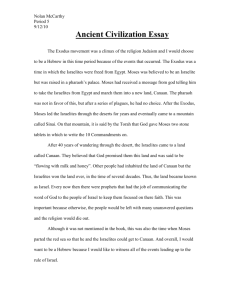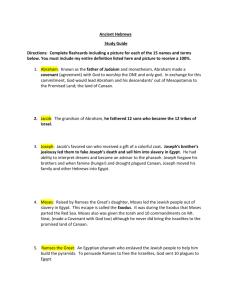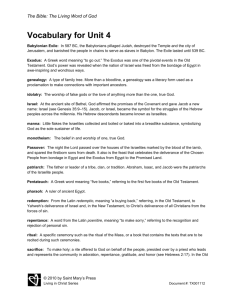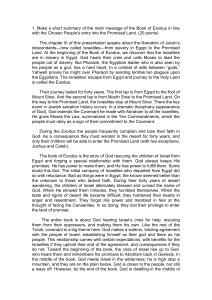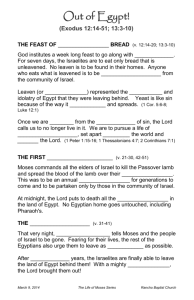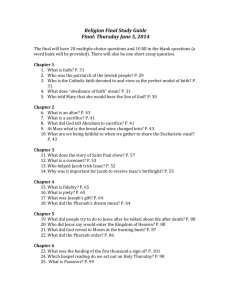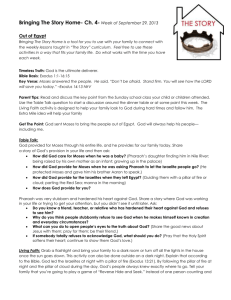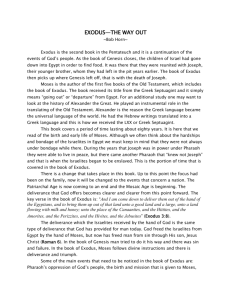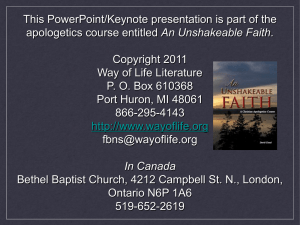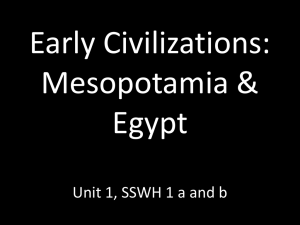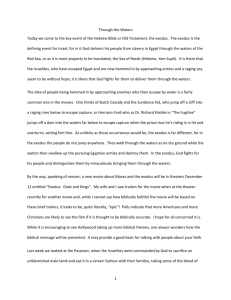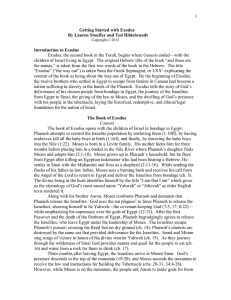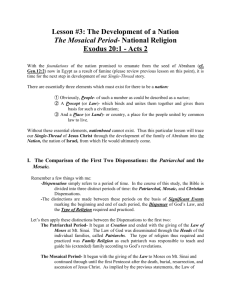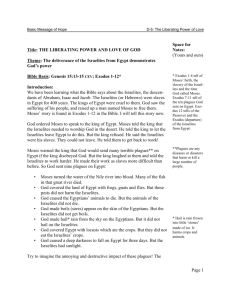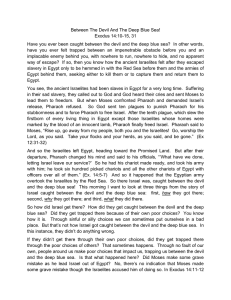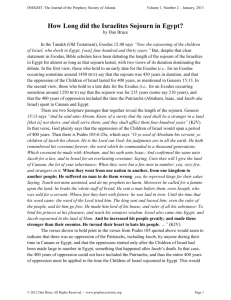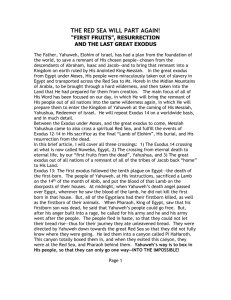The Long Way `Round Authored by Scott MacGregor I`m a history
advertisement
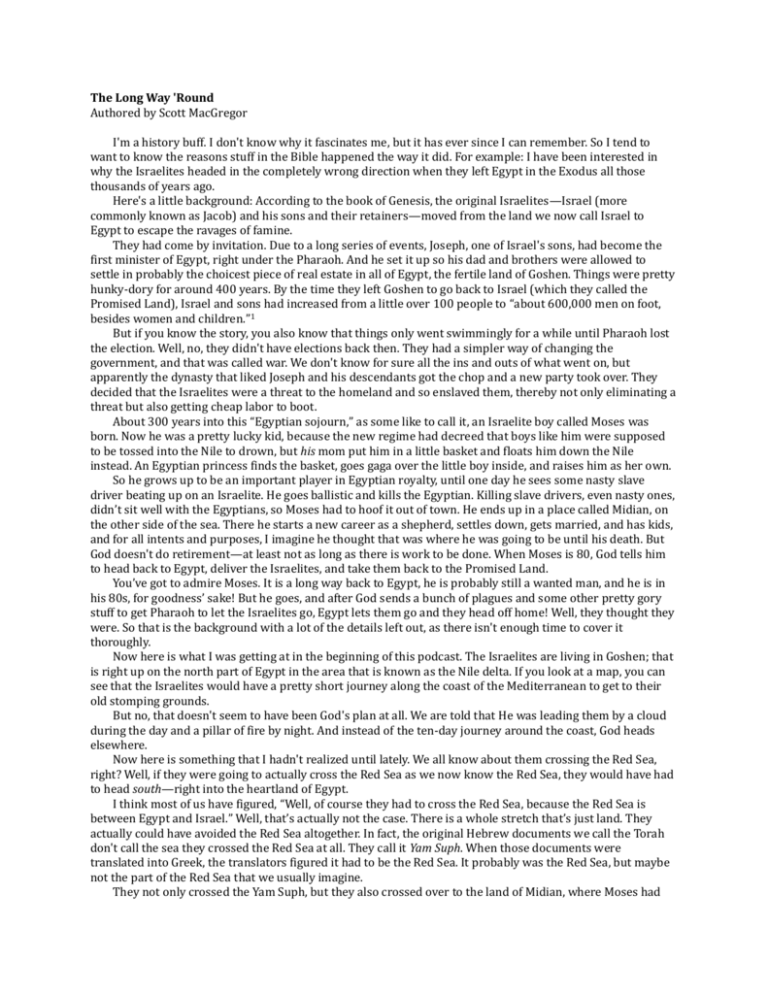
The Long Way 'Round Authored by Scott MacGregor I'm a history buff. I don't know why it fascinates me, but it has ever since I can remember. So I tend to want to know the reasons stuff in the Bible happened the way it did. For example: I have been interested in why the Israelites headed in the completely wrong direction when they left Egypt in the Exodus all those thousands of years ago. Here's a little background: According to the book of Genesis, the original Israelites—Israel (more commonly known as Jacob) and his sons and their retainers—moved from the land we now call Israel to Egypt to escape the ravages of famine. They had come by invitation. Due to a long series of events, Joseph, one of Israel's sons, had become the first minister of Egypt, right under the Pharaoh. And he set it up so his dad and brothers were allowed to settle in probably the choicest piece of real estate in all of Egypt, the fertile land of Goshen. Things were pretty hunky-dory for around 400 years. By the time they left Goshen to go back to Israel (which they called the Promised Land), Israel and sons had increased from a little over 100 people to “about 600,000 men on foot, besides women and children.”1 But if you know the story, you also know that things only went swimmingly for a while until Pharaoh lost the election. Well, no, they didn't have elections back then. They had a simpler way of changing the government, and that was called war. We don't know for sure all the ins and outs of what went on, but apparently the dynasty that liked Joseph and his descendants got the chop and a new party took over. They decided that the Israelites were a threat to the homeland and so enslaved them, thereby not only eliminating a threat but also getting cheap labor to boot. About 300 years into this “Egyptian sojourn,” as some like to call it, an Israelite boy called Moses was born. Now he was a pretty lucky kid, because the new regime had decreed that boys like him were supposed to be tossed into the Nile to drown, but his mom put him in a little basket and floats him down the Nile instead. An Egyptian princess finds the basket, goes gaga over the little boy inside, and raises him as her own. So he grows up to be an important player in Egyptian royalty, until one day he sees some nasty slave driver beating up on an Israelite. He goes ballistic and kills the Egyptian. Killing slave drivers, even nasty ones, didn’t sit well with the Egyptians, so Moses had to hoof it out of town. He ends up in a place called Midian, on the other side of the sea. There he starts a new career as a shepherd, settles down, gets married, and has kids, and for all intents and purposes, I imagine he thought that was where he was going to be until his death. But God doesn't do retirement—at least not as long as there is work to be done. When Moses is 80, God tells him to head back to Egypt, deliver the Israelites, and take them back to the Promised Land. You’ve got to admire Moses. It is a long way back to Egypt, he is probably still a wanted man, and he is in his 80s, for goodness’ sake! But he goes, and after God sends a bunch of plagues and some other pretty gory stuff to get Pharaoh to let the Israelites go, Egypt lets them go and they head off home! Well, they thought they were. So that is the background with a lot of the details left out, as there isn't enough time to cover it thoroughly. Now here is what I was getting at in the beginning of this podcast. The Israelites are living in Goshen; that is right up on the north part of Egypt in the area that is known as the Nile delta. If you look at a map, you can see that the Israelites would have a pretty short journey along the coast of the Mediterranean to get to their old stomping grounds. But no, that doesn't seem to have been God's plan at all. We are told that He was leading them by a cloud during the day and a pillar of fire by night. And instead of the ten-day journey around the coast, God heads elsewhere. Now here is something that I hadn't realized until lately. We all know about them crossing the Red Sea, right? Well, if they were going to actually cross the Red Sea as we now know the Red Sea, they would have had to head south—right into the heartland of Egypt. I think most of us have figured, “Well, of course they had to cross the Red Sea, because the Red Sea is between Egypt and Israel.” Well, that’s actually not the case. There is a whole stretch that’s just land. They actually could have avoided the Red Sea altogether. In fact, the original Hebrew documents we call the Torah don't call the sea they crossed the Red Sea at all. They call it Yam Suph. When those documents were translated into Greek, the translators figured it had to be the Red Sea. It probably was the Red Sea, but maybe not the part of the Red Sea that we usually imagine. They not only crossed the Yam Suph, but they also crossed over to the land of Midian, where Moses had been living during the last 40 years. It is now my theory, and I have been excited to find that it is held by others too, that it’s not the Sinai Peninsula as I had always imagined. The land of Midian was what we now call northwestern Saudi Arabia. Go back to that map again, and you will see that it seems the Israelites would have traveled through the Sinai and crossed what we now call the Gulf of Aqaba. The Gulf of Suez and the Gulf of Aqaba are both at the northern end of the Red Sea and look like a two-finger salute at the end of an arm. The Gulf of Aqaba is the one on the east. There are some names of places given in Exodus that might indicate that this theory is not right, but it’s good to remember that these are what we call anachronisms, names from hundreds or thousands of years later that are applied to places in antiquity. For instance, Exodus states that they did not go by the way of the land of the Philistines,2 but the Philistines didn't live in that area until many hundreds of years later. These anachronisms were simply naming places using names that the reader would be familiar with. But this is not really the crux of what I am writing the article about. The crux is this. Why meander east in the first place? What was God up to? When He could have let them go the direct route to the Promised Land, why go the “scenic route” through miles of desert? Well, to tell you the honest truth, the Bible gives us one reason in Exodus 13:17–18: “When Pharaoh let the people go, God did not lead them on the road through the Philistine country, though that was shorter. For God said, ‘If they face war, they might change their minds and return to Egypt.’ So God led the people around by the desert road toward the Red Sea.”3 But looking at all that happened to the Israelites on the Exodus journey, I think there is more to it, and it’s an object lesson for all of us. Sometimes our lives seem to be going the long way around. We are all interested in reaching goals, but I think God is more interested in the journey. Many of us wonder why it takes so long to achieve things. We wish we could just hurry up and get there. We’re like the proverbial children on a long car ride who keep asking, “Are we there yet?” God likes the journey because He has a lot to teach us through it. In fact, we will probably benefit more from those lessons than we will by getting to the destination. It’s a bit like going through school. We really learn nothing at graduation. We learn doing the years of course work. The children of Israel obviously had a lot more to learn than what they learned on the initial trek through Sinai and across the sea. Even that wasn’t enough, because they then had to wander for 40 years in the desert before they were ready to graduate and claim their homeland. In my life, I have often felt I was taking the long way 'round. I’ve been pretty sick of it at times and wished I would get there already. But I am now coming to see that God's scenic route has been the best for me. I still have a long way to travel, but I have a new mantra: “Enjoy the journey!” You might as well too. That just seems to be the way God does it. Footnotes 1Exodus 12:37 2Exodus 13:17 3New International Version Read by Stephen Larriva. Music by sindustry(CC). Copyright © 2013 by The Family International Tags: Bible study, God’s plan, patience, trusting God
